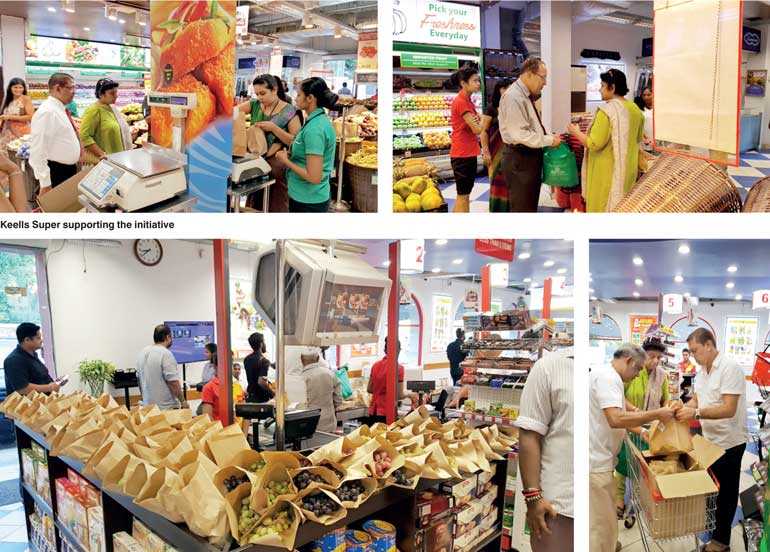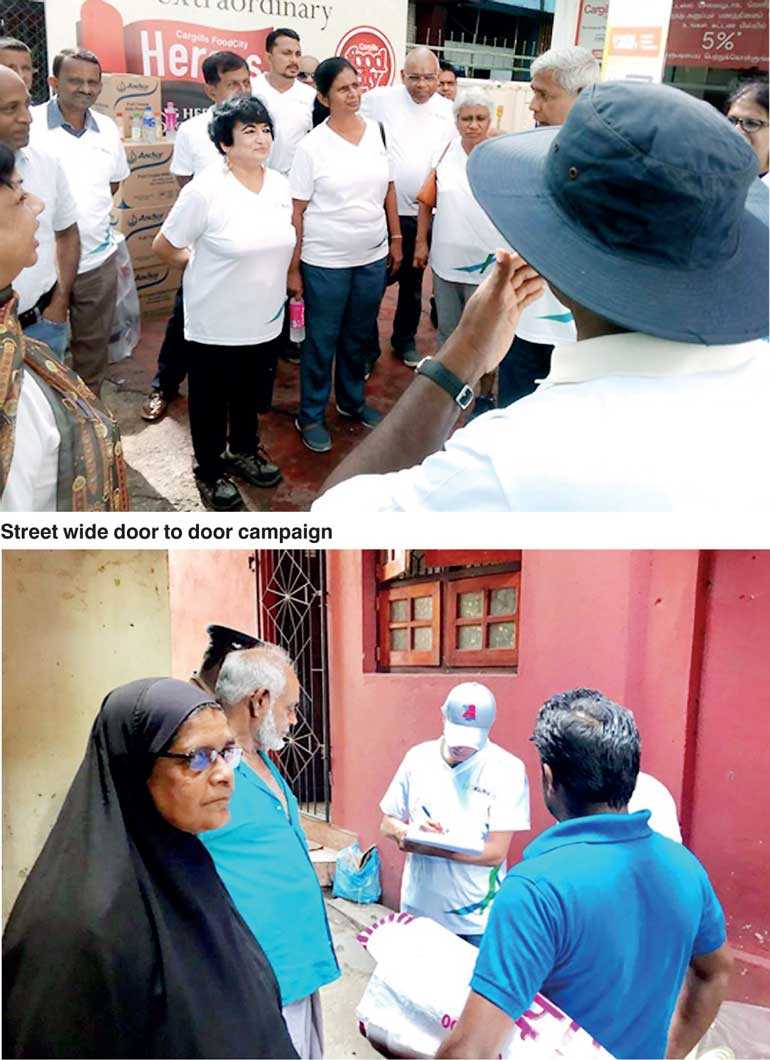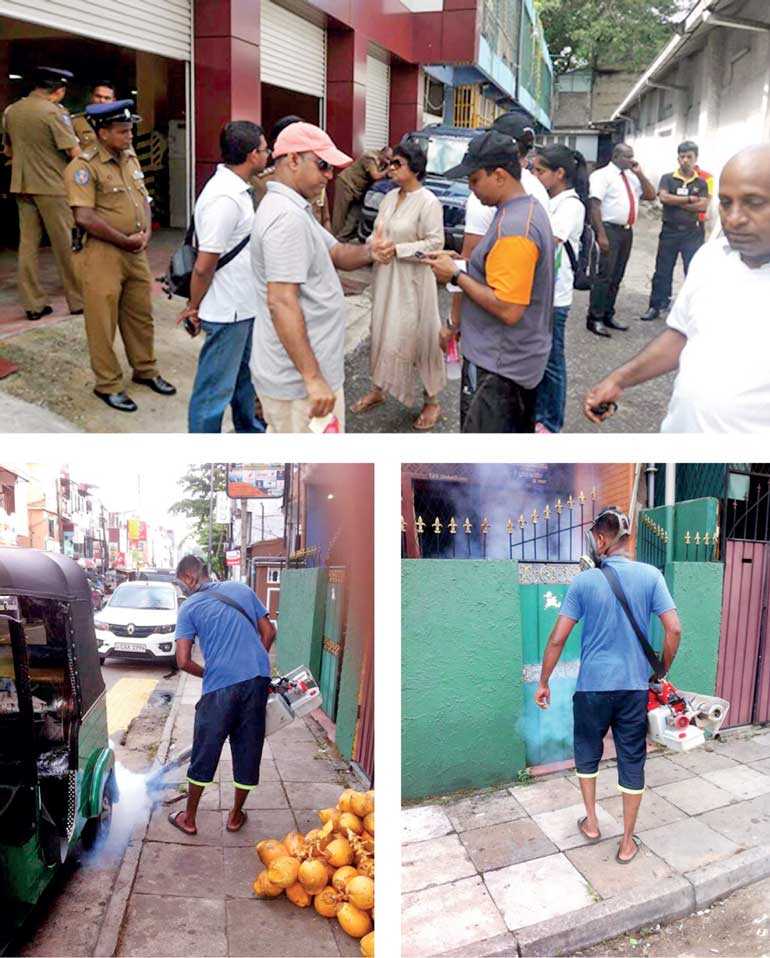Friday Feb 20, 2026
Friday Feb 20, 2026
Wednesday, 13 June 2018 00:01 - - {{hitsCtrl.values.hits}}

Sumi Moonesinghe, who launched the ‘No Kunu’ (No Garbage) initiative to transform the country into a cleaner and greener nation, has called on more corporates to join the initiative.
She requested all corporates to consider giving an eco-friendly reusable cloth bag for grocery shopping, instead of calendars annually to avoid adding more garbage.
Moonasinghe also suggested all citizens including the leading companies which create garbage, should support the ‘No Kunu’ campaign.
“Once we complete cleaning up Colombo, the legislators – parliamentarians, provincial councillors, Pradeshiya Sabha members – have to continue the process, using funds from their decentralised budgets to keep the underdeveloped areas clean,” she told Daily FT.
Retired and in her 70s, she said that she had no hidden agendas in leading the ‘No Kunu’ campaign but wanted to give back something for the country, which gave her free education.
“The ‘No Kunu’ campaign is my way of saying thank you to my country,” she said calling on more people to volunteer for the campaign.
Following are excerpts of the interview:
By Shanika Sriyananda
Q: What made you start the ‘No Kunu’ campaign?
A: Over a year after the Meethotamulla tragedy, on 19 May we decided to launch the ‘No Kunu guardians of the city’ initiative from Layards Broadway together with a team of former staff of the business I was responsible for until September 1996.
The vision is for all citizens of Sri Lanka who are creators of garbage to take the ‘No Kunu’ pledge to keep the perimeter of one’s premises free from garbage, be it your home, office, hotel, restaurant, café, grocery store, supermarket or shopping mall.
As a first step, we called on the CEOs of the large corporates in the city of Colombo to adopt the shanties in the vicinity of their head offices. The shanty dwellers have such burning issues that their least priority is garbage disposal. We decided to assist them by providing the necessary tools and educate them.
The CMC has a viral role to play in this exercise, as it collects the garbage from the roadside and transports it to garbage dumps outside the city.
Q: The private sector can play a major role in this campaign. What do you have to say about its contribution?
A: We are calling upon the large corporates (mainly the FMCGs) to consider educating the public, especially the housewives and children, about segregation of garbage in their usual advertisement campaigns.
We are also calling upon all corporates to consider giving, an eco-friendly reusable cloth bag for grocery shopping, instead of calendars annually, which add to garbage issues. Today the majority use the calendar and diary on the mobile phone. Technology is moving at lightning speed and is transforming the way we live. Internet and digital devices have already taken over.
In that scenario there has to be a paradigm shift in the way we the baby boomers, who are currently running the establishments, to be abreast of these technological advances. Until that day dawns we have to resort to old methods of minimising garbage.
Q: Once the ‘No Kunu’ campaign comes to an end in Colombo, who will take over cleaning and maintenance?
A: It is up to the legislators – parliamentarians, provincial councillors, Pradeshiya Sabha members – to continue the process, using funds from their decentralised budgets to look after these wattas and other underdeveloped areas.
We are very encouraged by the enormous support from the public. I am in my 70s and have no hidden agendas in leading this campaign. My sole intention in my retirement is to give back something to my country, which gave me free education up to my Master’s Degree in Electronics in the UK. The ‘No Kunu’ campaign is my way of saying thank you to my country.
Q: What are your plans for safe disposal of e-waste?
A: We have not yet drawn up plans for e-waste disposal. But I earnestly hope the FMCG companies will consider educating the public through their advertisement campaigns. For example, ‘Remember to put the used yoghurt cup into the recycle bin’ or ‘Don’t throw the plastic bottle on the road,’ or ‘Put the used battery or old mobile phone into the toxic waste bin’. When the ‘No Kunu team’ with sponsors, staff, environmental police and the CMC district engineer visit shanty homes, that’s what we do.
We do not have access to regular media to educate the public due to its very high cost. The ‘No Kunu’ initiative also has plans to have school awareness programmes by promoting games on waste segregation and give prizes for the students who dispose trash in the correct bins.
Q: Similar programs are launched to mark World Environment Day every year but nothing is heard about them after. How is the ‘No Kunu’ campaign different?
A: We are determined to continue with it as we are single-mindedly focused to achieve. When we started our business, we introduced a product which was not even heard of in Sri Lanka. It was launched in 1984 and in 12 years we captured 70% market share beating the world’s largest food company. That team which was called the ‘A Team,’ named after the popular TV series called ‘A Team,’ is behind ‘No Kunu’.
Our slogan is ‘we are single-mindedly focused on achieving and nothing can stop us now’. We strongly request the corporates to join this initiative, to save this country from the garbage menace. When I spoke to Kumar Sanggakkara, our much-loved and highly-respected cricket legend, he immediately volunteered to do the video clip pro bono, endorsing the pledge, which went viral on social media. It became a very powerful message and we are very grateful to him. He has taken the ‘No Kunu pledge’ and when we go to houses we ask the residents take this pledge.
Q: Do you have clean-ups on beaches and river banks in your schedule?
A: Yes, we will have a beach clean-up in September with some youth, which will run along the Mattakkuliya beach collecting garbage. We also plan to do a similar campaign along the Mirissa beach with exchange students from overseas who spend a gap year in Sri Lanka.

